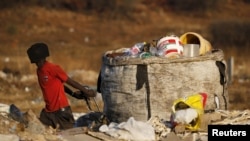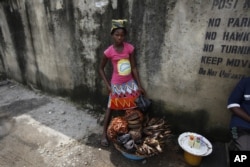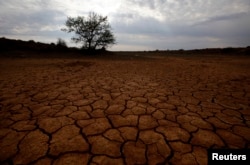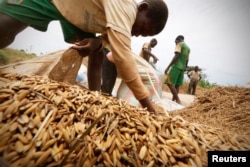The top concern among Africans in 36 different countries is unemployment, a new opinion poll found.
Afrobarometer, a pan-African, nonpartisan research network, on Thursday released its latest poll about what Africans see as their most important problems and their top priorities for government spending. The survey was based on interviews with almost 48,000 citizens, Afrobarometer officials said.
“It would appear that across the African continent, the topmost problem that people want their governments to address is unemployment,” said Boniface Dulani, Afrobarometer’s field operations manager in Malawi.
“But there is a variation in countries," he added. "Some of the countries that face food shortages, like Mali [and] Malawi, for example, people in these countries tend to prioritize food availability. But for the large part of countries on the continent, unemployment is what people say the government should be addressing.”
Dulani said the other most frequently cited problems involved health and education, although poverty and food shortages together were also a dominant concern.
“The results are released at country level, and this is done through the media,” Dulani said. "We also encourage our partner organizations in each country to make presentations to policymakers so that the policymakers can hear the people’s voices. Then, after we’ve done all that, we reach what we call a global release where we are now, where we are releasing results that apply across the entire continent.”
Difference in emphasis
The survey found that the poor ranked problems differently than did wealthier citizens, emphasizing concerns about elements of basic survival, including health, water and food, as well as infrastructure, and placing comparatively less emphasis on unemployment, crime and security.
The polling also showed that investment priorities varied by country. Agricultural development was the top priority in Malawi, Mali and Burundi, while infrastructure headed the list in Lesotho. Security ranked as a higher priority in Kenya, Nigeria and Tunisia than in other countries, Dulani said.
Critics say governments in Africa have not paid much attention to the polling results made available to them. They contend that administrations in Africa have yet to take advantage of the outcomes of previous surveys to try to improve the lives of their citizens.
Dulani said it's time for authorities to make use of the data available to them to meet citizens' expectations.
“The survey gives us an opportunity for ordinary people to say what they want, and hopefully, the policymakers can also take up what the people are saying and act on it rather than acting on what they themselves consider to be the priorities,” he said.
“What our findings are suggesting is that the benefits of [African] economic growth are trickling down to the masses and that, yes, the economies are growing, but jobs are not being created," Dulani said. "And the jobs that are sometimes created are not good enough, and we are still not addressing some of these issues of water, education, sanitation and so on.”







